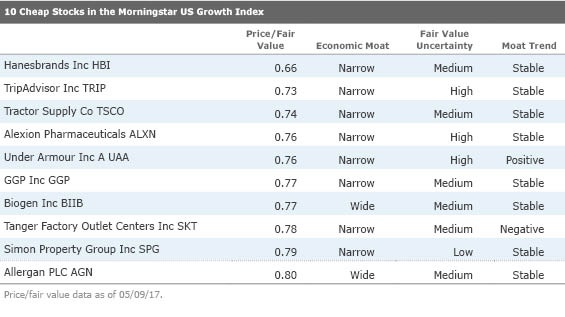10 Growth Stocks at Reasonable Prices
We examined the 500-plus holdings in the Morningstar US Growth Index and found some stocks with decent growth prospects at reasonable valuations.
Growth investing means different things to different people. Some investors would gladly pay a premium to own a share of a fast-growing company. More price-sensitive investors, on the other hand, would like to see a suitable margin of safety before shelling out their hard-earned cash.
Growth companies are generally thought of as high-quality firms, and they often trade at high price/earnings and book/value ratios as they are believed to have an above-average chance of growing their earnings faster than industry peers or the market as a whole. By contrast, value stocks, as we discussed last week, are often "cheap for a reason"; in other words, they are facing a tough economic environment, or a tough business outlook. Perhaps they are under some sort of regulatory or litigation risk, or there is uncertainty about the company's future. Maybe there are new managers in charge or the company is undergoing a restructuring, or both.
For these reasons, some people think of value investing as the opposite of growth investing, but in fact, the two are not diametrically opposed. In reality, many investors are first and foremost looking for companies with improving fundamentals that are trading at reasonable valuations.
You may have heard this referred to as "growth-as-a-reasonable price" investing. This philosophy strives to combine strong earnings growth prospects and good value. A quarter or two (or even three) of disappointing earnings may cause an erstwhile growth darling to be shunned by momentum investors, at which point the stock may look more enticing to a GARP-style investor. Like value investors, growth-at-a-reasonable price investors are usually looking for companies whose shares are temporarily depressed, but that have some catalyst for growth in the works. GARP investors are sensitive to high prices--they hunt for stocks that feature lower-than-average price multiples than those of more traditional growth stocks. But GARP stocks may not be selling at multiples that are quite as low as value stocks'.
To find some companies that might appeal to growth-at-a-reasonable-price investors, we examined the more than 500 constituents of the Morningstar US Growth Index. First we removed companies that our analysts do not cover. Then we focused only on firms that have economic moats of wide or narrow, which means our analysts think the company has a durable competitive advantage that will allow it maintain its profitability over the long term. Finally, we sorted the stocks that passed our screen by lowest price/fair value to find the 10 cheapest growth stocks. The results are listed in the table below, along with some highlights from our research reports on a few of the companies.

TripAdvisor
TRIP
Senior equity analyst Dan Wasiolek thinks TripAdvisor has a narrow moat, owing to its sustainable network effect within the online travel industry. Despite intense competition, Wasiolek expects TripAdvisor's network advantage to remain in place over the next decade, supported by a solid global position, low penetration of travel advertising spending allocated online, and increased spending on marketing. He expects TripAdvisor's sales growth to slightly exceed the industry's high-single-digit annual rate we forecast on average over the next several years. Further, TripAdvisor's instant booking initiative, which strives to collect a piece of the bookings transactions that previously had not been collected by the firm, expands the firm's business model and revenue opportunity.
Under Armour
UA
As a leading innovator of performance apparel, footwear, and accessories with inroads into connected fitness (the intersection of technology and fitness), narrow-moat Under Armour has evolved into a global athletic brand and remains a leader in innovation, says sector director R.J. Hottovy. Consumers have shown great affinity for the brand across multiple product categories, and retailers have been more than happy to reduce their dependence on Nike and offer an alternative to Adidas and other vendors. The firm's entry into additional categories and international expansion has enjoyed early success, along with ongoing gains in the core domestic apparel business. That said, recent investments and tepid consumer demand for athletic apparel have resulted in poor returns and softer near-term fundamentals. Hottovy, however, believes these investment priorities can help to solidify the pricing power inherent in the brand, which is the primary factor behind its narrow moat rating.
Biogen
BIIB
Biogen's specialty-market-focused drug portfolio (multiple sclerosis and cancer) and novel, neurology-focused pipeline create a wide economic moat, says strategist Karen Andersen. Many drug companies products face competition from biosimilars, which are very similar versions of biologic drugs but unlike generics are not exact copies, but Andersen thinks barriers to entry for potential biosimilars to Biogen's products are high. She also believes Biogen has a strong R&D strategy for maintaining its leadership in multiple sclerosis, where pricing power is strong, patient need for novel therapies is high, and the pipeline has been particularly productive. Returns on invested capital, which she forecasts will average above 20% during our 10-year explicit forecast period, easily exceed our 7.2% estimate of Biogen's cost of capital, she said.
Disclosure: Morningstar, Inc. licenses indexes to financial institutions as the tracking indexes for investable products, such as exchange-traded funds, sponsored by the financial institution. The license fee for such use is paid by the sponsoring financial institution based mainly on the total assets of the investable product. Please click here for a list of investable products that track or have tracked a Morningstar index. Neither Morningstar, Inc. nor its investment management division markets, sells, or makes any representations regarding the advisability of investing in any investable product that tracks a Morningstar index.

/s3.amazonaws.com/arc-authors/morningstar/3a6abec7-a233-42a7-bcb0-b2efd54d751d.jpg)
/cloudfront-us-east-1.images.arcpublishing.com/morningstar/MFL6LHZXFVFYFOAVQBMECBG6RM.png)
/cloudfront-us-east-1.images.arcpublishing.com/morningstar/HCVXKY35QNVZ4AHAWI2N4JWONA.png)
/cloudfront-us-east-1.images.arcpublishing.com/morningstar/EGA35LGTJFBVTDK3OCMQCHW7XQ.png)
:quality(80)/s3.amazonaws.com/arc-authors/morningstar/3a6abec7-a233-42a7-bcb0-b2efd54d751d.jpg)